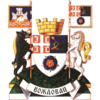Vozdovac
|
Voždovac Вождовац |
||
|---|---|---|
| Urban neighborhood and municipality | ||

Braće Jerković neighbourhood
|
||
|
||
 Location of Voždovac within the city of Belgrade |
||
 Location of the city of Belgrade within Serbia |
||
| Country |
|
|
| City | Belgrade | |
| Status | Municipality | |
| Settlements | 5 | |
| Government | ||
| • Type | Municipality of Belgrade | |
| • Mun. president | Aleksandar Savić (SNS) | |
| Area | ||
| • Total | 148 km2 (57 sq mi) | |
| Population (2011) | ||
| • Total | 157,152 | |
| • Density | 1,100/km2 (2,800/sq mi) | |
| Time zone | CET (UTC+1) | |
| • Summer (DST) | CEST (UTC+2) | |
| Postal code | 11040 | |
| Area code(s) | +381(0)11 | |
| Car plates | BG | |
| Website | www |
|
Voždovac (Serbian Cyrillic: Вождовац, pronounced [ʋǒːʒdoʋats]) is an urban neighborhood and one of 17 city municipalities which constitute the city of Belgrade, the capital of Serbia. According to the 2011 census results, the municipality has a population of 157,152 inhabitants.
The neighborhood of Voždovac is located 4 to 5 kilometres (2 to 3 miles) south of downtown Belgrade, on a hill in the northern part of the municipality. Three long, more or less parallel streets shape the neighborhood into an elongated form in the north-west to south-east direction: western border is marked by Bulevar Oslobođenja (Boulevard of Liberation), which also makes the border to the municipality of Savski Venac, eastern by Kumodraška Street, while Vojvode Stepe Street stretches in between. Due to its shape, Voždovac borders many other neighborhoods: Autokomanda to the north, Diplomatska Kolonija on the north-west, Banjica (and Banjica Forest) on the west, Trošarina and Banjica II on the south-west, Kumodraž (its sub-neighborhoods of Kumodraž II and Torlak) on the south, Braće Jerković II and Mitrovo Brdo on the south-east, Braće Jerković on the east and Dušanovac on the north-east.
...
Wikipedia

